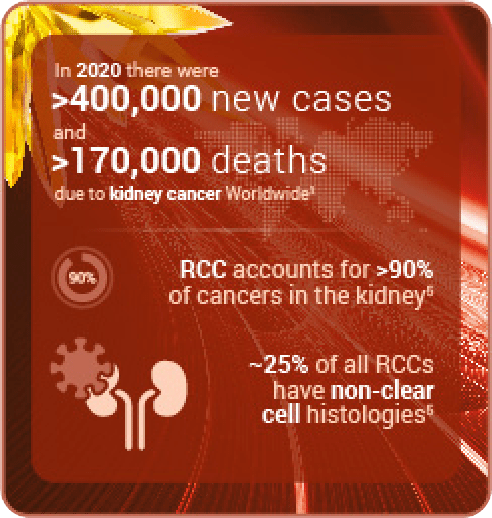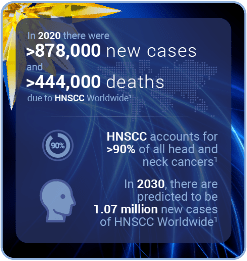Exelixis is committed to solid tumor research to help find effective treatments for these diseases. We have recently started 2 new solid tumor studies, STELLAR-304 in metastatic non–clear cell renal cell carcinoma (nccRCC) and STELLAR-305 in metastatic head and neck squamous cell carcinoma (HNSCC), involving participants from around the world.

The most common histological variant of RCC is clear cell RCC (ccRCC), which makes up ~75% of all RCC, and nccRCC encompasses the remaining ~25% of tumors.2 For patients with nccRCC, there have been no dedicated, randomized, phase 3 studies to adequately characterize benefit, thus many oncology clinical practice guidelines recommend enrollment in clinical trials as the preferred strategy for patients with nccRCC.3,4

HNSCC comprises a diverse group of tumors affecting the lip, oral cavity, nasopharynx, oropharynx, hypopharynx, and larynx; and is the seventh most common type of cancer worldwide.1,5 Despite available therapy, the 5-year overall survival of patients with HNSCC is ~50%.6 Furthermore, with a median survival of 6 to 15 months, novel treatment strategies are particularly needed in patients with recurrent or metastatic HNSCC.7
The goal of these studies is to determine if XL092—an orally bioavailable inhibitor of several tyrosine kinases implicated in tumor growth, angiogenesis, and immune cell regulation—in combination with immunotherapy, could be a successful treatment for metastatic nccRCC and HNSCC in the future. This website provides information about the STELLAR-304 and STELLAR-305 clinical trials for healthcare professionals who may be interested in enrolling their patients.
References
- World Health Organization. International Agency for Research on Cancer. Estimated age-standardized incidence and mortality rates (World) in 2020. Available from: https://gco.iarc.fr/today/home. Accessed August 2023.
- Hsieh JJ, et al. Renal cell carcinoma. Nat Rev Dis Primers. 2017;3:17009.
- Motzer RJ, et al. Kidney cancer, Version 3.2022, NCCN Clinical Practice Guidelines in Oncology. J Natl Compr Canc Netw. 2022;20(1):71-90.
- Escudier B, et al. Renal cell carcinoma: ESMO Clinical Practice Guidelines for diagnosis, treatment and follow-up. Ann Oncol. 2019;30(5):706-720.
- Johnson DE, et al. Head and neck squamous cell carcinoma. Nat Rev Dis Primers. 2020;6:92.
- European Commission. ECIS – European Cancer Information System. Available from: https://ecis.jrc.ec.europa.eu/. Accessed August 2023.
- Pontes F, et al. Survival predictors and outcomes of patients with recurrent and/or metastatic head and neck cancer treated with chemotherapy plus cetuximab as first-line therapy: A real-world retrospective study. Cancer Treat Res Commun. 2021;27:100375.




